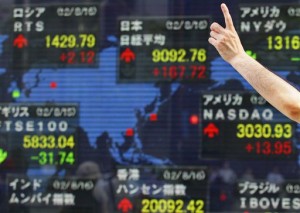Asian markets lower, weaker yen buoys Tokyo

A man gestures in front of a securities firm’s electronic stock board in Tokyo on Aug. 16, 2012. Asian markets edged lower in subdued holiday trade Monday, Aug. 20, 2012, with Tokyo stocks buoyed by a weaker yen amid dimming chances of fresh stimulus measures by the US Federal Reserve. AP PHOTO/SHIZUO KAMBAYASHI
HONG KONG—Asian markets edged lower in subdued holiday trade Monday with Tokyo stocks buoyed by a weaker yen amid dimming chances of fresh stimulus measures by the US Federal Reserve.
Tokyo’s Nikkei index briefly breached the 9,200 level for the first time in more than three months as the yen initially eased against the dollar with dealers continuing to shift away from the safe haven Japanese currency.
The Nikkei ended flat, gaining 0.09 percent as late profit-taking offset early gains, to 9,171.16. Sydney eased 0.13 percent, or 5.8 points, to close at 4,364.3, while Seoul ended flat at 1,946.31.
Hong Kong stocks ended flat, edging down 0.06 percent, or 11.8 points, to 20,104.27, while Shanghai closed 0.37 percent, or 7.93 points, lower at 2,106.96.
“The eventual bias is skewed downwards, as the recent market rally had priced in plenty of expectations for easing actions from both the US and Europe,” said Ben Kwong, chief operating officer at KGI Asia.
Article continues after this advertisementEuropean stocks ended last week higher while US markets closed it out with solid gains, with the Dow hitting its highest level since the last days of 2007 and the S&P 500 just shy of its four-year peak.
Article continues after this advertisementThe Dow Jones Industrial Index ended 0.51 percent higher for the week at 13,275.20. The broader S&P 500 picked up 0.87 percent to 1,418.16, while the Nasdaq gained 1.84 percent to close at 3,076.59.
The dollar strengthened against most Asian currencies following a raft of US economic data for the July-August period that was, if not full of spark, notably not negative, lowering chances of a new round of monetary stimulus.
Consumer prices were flat, jobless claims unchanged, some manufacturing indicators were lower but retail sales improved in the world’s largest economy.
The dollar stabilized against the yen in Tokyo trade, after gaining 1.7 percent against the Japanese currency last week.
The greenback bought 79.48 yen in afternoon trade against 79.55 yen in New York late Friday, while the euro was worth $1.2328, slightly down from $1.2330 in US trade. The euro eased to 97.98 yen from 98.10 yen.
The common European currency’s decline came amid dollar-buying on the heels of US economic reports including a new survey released Friday that showed consumers were a little more upbeat than in July.
“The euro/dollar is top-heavy as the dollar is bought,” Junichi Ishikawa, forex analyst at IG Market Securities in Tokyo, told Dow Jones Newswires.
But the euro is supported by expectations that the European Central Bank would purchase struggling eurozone countries’ sovereign debt following a report in the Germany news weekly Der Spiegel.
The report Sunday said that the ECB was considering buying the bonds of crisis-wracked eurozone countries to help contain their borrowing costs.
German Chancellor Angela Merkel’s statement last week backing ECB chief Mario Draghi’s position on making sure the euro would not fail also revived hopes of strong action to solve the eurozone debt crisis.
In oil, New York’s main contract, West Texas Intermediate light sweet crude for September delivery, was up 29 cents to $96.30 a barrel in afternoon trade, and Brent North Sea crude for delivery in October climbed 63 cents to $114.34.
Gold was at $1,615.20 at 1000 GMT, compared to $1,617.34 on Friday.
In other markets:
— Wellington rose 0.59 percent, or 21.43 points, to 3.661.09.
Fletcher Building was up 0.31 percent to NZ$6.57, while Air New Zealand gained 1.1 percent to NZ$0.935.
— Taipei fell 0.48 percent, or 36.01 points, to 7,431.91.
Leading smartphone maker HTC shed 4.20 percent to Tw$239.5 while Taiwan Semiconductor Manufacturing Co. was 0.49 percent higher at Tw$82.4.
— Bangkok added 0.42 percent, or 5.09 points, to 1,229.00.
Coal producer Banpu gained 2.20 percent to 464 baht, while grocery store operator Siam Makro rose 2.99 percent to 345 baht.
— Jakarta, Kuala Lumpur, Mumbai, Singapore and Manila were closed for public holidays.